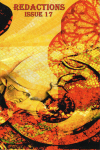Redactions – 2013
Poetry takes many forms, and this issue of Redactions is a stark reminder for me that I just don’t “get” some of those forms. I did run across several bits of writing worth investigating with more depth, but for the most part I was left grasping for meaning. All 26 poets represented should be commended for the hard work which they have had accepted, but readers need to know that this issue is more challenging than casual perusal, and I found very few moments of slack-jawed inspiration. Much like some of the grueling pages I had to go through in my graduate program, I am left feeling a stronger reader for focusing my attentions on finishing this magazine.
Poetry takes many forms, and this issue of Redactions is a stark reminder for me that I just don’t “get” some of those forms. I did run across several bits of writing worth investigating with more depth, but for the most part I was left grasping for meaning. All 26 poets represented should be commended for the hard work which they have had accepted, but readers need to know that this issue is more challenging than casual perusal, and I found very few moments of slack-jawed inspiration. Much like some of the grueling pages I had to go through in my graduate program, I am left feeling a stronger reader for focusing my attentions on finishing this magazine.
Let’s start with a few of the pieces of work that really stood out to me.
Jon Palzer’s “In Solitary” takes readers into confinement. It carries a parenthetically wrapped subtitle of “upon hearing how one POW stayed sane.” The stanzas that follow it do not disappoint. Simple language surrounding such a terrifying experience creates a commendable presentation. Lines that especially stood out to me include “But still I leave this corner to find somewhere / else to go, shimmy as though in a low tunnel” and “Never have the time, I say, never have enough / patience. Can’t stay in one spot to long.” I’m unsure whether or not the story is based on personal experience, but remain glad that the story has been told.
Post-apocalyptic is a trending subject matter that Jeannine Hall Gailey sheds a light on in the block style poem titled, “Epilogue—Or, A Story for After,” It’s about an elder talking to a new generation in a campfire style scene I hope never to have to encounter. A sample of this work’s strength can be felt in the following line: “a house made of a square and a triangle, a single daisy in the yard, and two smiling stick figures. This is what we dreamed of . . .”
Michael Robins, Anthony Frame, Carine Topal, and Mary Biddinger are four of the poets who were able to get two poems each published in this issue. The fifth poet, Michael Meyerhofer, blew me away with both works. “Quetzacoatlus” uses the metaphor of flying dinosaurs to study poetry. Maybe my affinity for this poem proves my inner nine-year-old is still alive and well, but with phrasing like, “Nowadays, you can only see Poetry’s remains / in museums—guarded, roped off, impossible to touch,” I think it’s safe to say this piece of work is a winner. “Breakfast” is his other poem, offering an accessible look at the connection between society in general’s daily life and its connection to poetry.
I do want to throw in an example of what I meant as challenging work. Michelle Donahue’s “did you know” still has me scratching my head. First off, the title is neither capitalized nor does it make use of proper questioning punctuation at the end. Hopefully a couple of you are laughing as you read this, because I know that is a pedantic thing to point out, but here are a couple of lines from the poem for your consideration: “there is no coral only moose / I do not see & wolves & water which looks like / my ocean but tastes wrong.” I’m willing to make myself look uneducated by stating I’m glad there is space in a magazine for things I don’t understand because it helps me keep learning as I read.
Poetics is a section of the magazine which takes up eight pages and is titled “Tom’s Celebration.” There are reviews of poetry books and poetry stylings. Over the course of reading through it, I wanted to have access to the other sections that this magazine has included over the years because of how in-depth it is.
Prose is the final section of the magazine. Angela Woodward, Jon Steinhagen, Nathan E White, and Louis Bourgeois are the authors represented by their relatively short (compared to other magazines) two-page pieces of work. “She” by Angela Woodward was my personal favorite. It carries a snappily worded pace and is about the narrator looking up entries in an online dictionary. I found myself rereading the piece because of its structure and sound as I perused the page. “Under street I found the modern meaning illustrated with a concrete cityscape. This dissolved into a muddy track, and then into a bare impression of paw prints disappearing into the underbrush.”
This is a magazine for the poetry hard-nosed. Do not order this lightly. Pick up your copy of Redactions: Poetry, Poetics, & Prose only if you are willing to put in the work! I promise you will get something out of it if you do.
[www.redactions.com]





